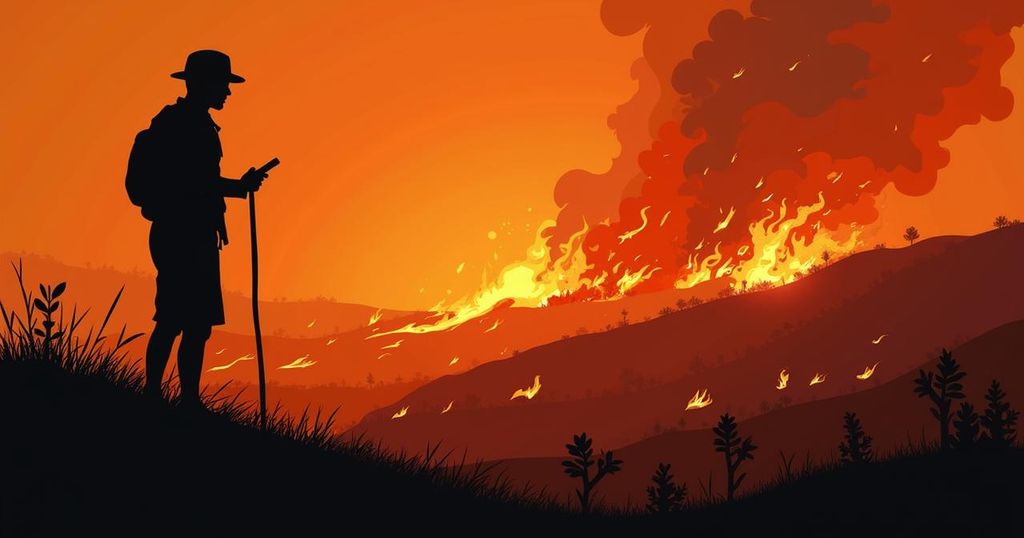Brazil’s Climate Catastrophe: Will It Rise to the Challenge?
Brazil is undergoing a significant climate crisis characterized by record-breaking wildfires, hazardous air quality, and severe flooding due to climate change. The current fires are the worst in a decade, with more than 47,000 alerts and an 85% increase in affected areas. The government under President Lula is facing criticism for failing to translate environmental rhetoric into tangible action as Brazil seeks to assert itself as a leader in global environmental issues. As the country prepares for the UN Climate Conference (COP30) in 2025, aligning economic development with ambitious climate action is paramount for sustainable change.
Brazil is currently engulfed in a climate crisis, marked by unprecedented urban heat, hazardous air quality, and the destruction of ecosystems due to rampant wildfires. The ongoing environmental catastrophe has raised alarm bells as over 47,000 fire alerts, the highest in a decade, have been recorded this year, with a staggering 85% increase in affected areas compared to averages since 2019. In addition to the raging fires, Brazil is experiencing intense rainfall and flooding, further complicating the situation. Renowned climatologist Carlos Nobre describes this as an ominous scenario, where the combination of man-made actions, such as deforestation and land clearing, alongside the effects of climate change, has created a perfect storm for wildfires. Brazil is facing its longest drought in seven decades, severely impacting vast areas, including the Madeira River, which is at its lowest levels in history. The consequences extend beyond environmental degradation, affecting public health and economic stability, particularly in agribusiness, which has incurred billions in losses due to fire damage. As Brazil approaches the UN Climate Conference (COP30) scheduled for 2025, it aspires to be a global leader in environmental stewardship. However, the government, under President Lula, faces criticism for not aligning its substantial rhetoric with effective action against climate crises. Although some progress has been made compared to previous administrations, inconsistencies in policy implementation, such as delays in fire prevention measures and controversial plans for expanding oil exploration, cloud Brazil’s environmental ambitions. In light of these challenges, Brazil must demonstrate a commitment to harmonizing economic development with aggressive decarbonization efforts. The current development of its Nationally Determined Contribution (NDC) presents an opportunity for Brazil to set ambitious greenhouse emissions reduction targets, which could pave the way for a sustainable future while mitigating climate change’s adverse impacts. Adapting and enhancing resilience against climate change must become integral to Brazil’s socio-economic policies. The time for decisive and unified action is now, as Brazil confronts an urgent climate reality.
The current climate crisis in Brazil is a severe manifestation of accelerated climate change, presenting multiple environmental, social, and economic challenges. The Brazilian landscapes are engulfed in smoke from rampant wildfires, with thousands of hectares burning and cities suffering from hazardous air quality. In addition to the fires, the nation is grappling with extreme weather patterns, including prolonged drought and severe flooding, intensifying the impacts of climate change on both urban areas and rural landscapes. Experts warn that human actions such as deforestation and agricultural expansion exacerbate these issues. Consequently, Brazil’s upcoming potential leadership in international climate negotiations will be scrutinized, particularly regarding its commitment to implementing effective climate policies that align with its aspirations.
As Brazil faces its pressing climate challenges, it stands at a crossroads. While there are opportunities to demonstrate effective environmental leadership on the global stage, the country must translate its commitments into concrete actions. Ensuring that economic development efforts align with sustainability goals is crucial. Moreover, Brazil must prioritize its adaptation strategies to bolster resilience against the multifaceted effects of climate change. The future of Brazil’s ecosystems, public health, and economic stability rests on its ability to respond decisively to this crisis. In conclusion, the country has the potential to become a model for low-carbon development, provided it clarifies and commits to its environmental policies while taking immediate actions to combat the destructive forces of climate change.
Original Source: thecityfix.com




Post Comment